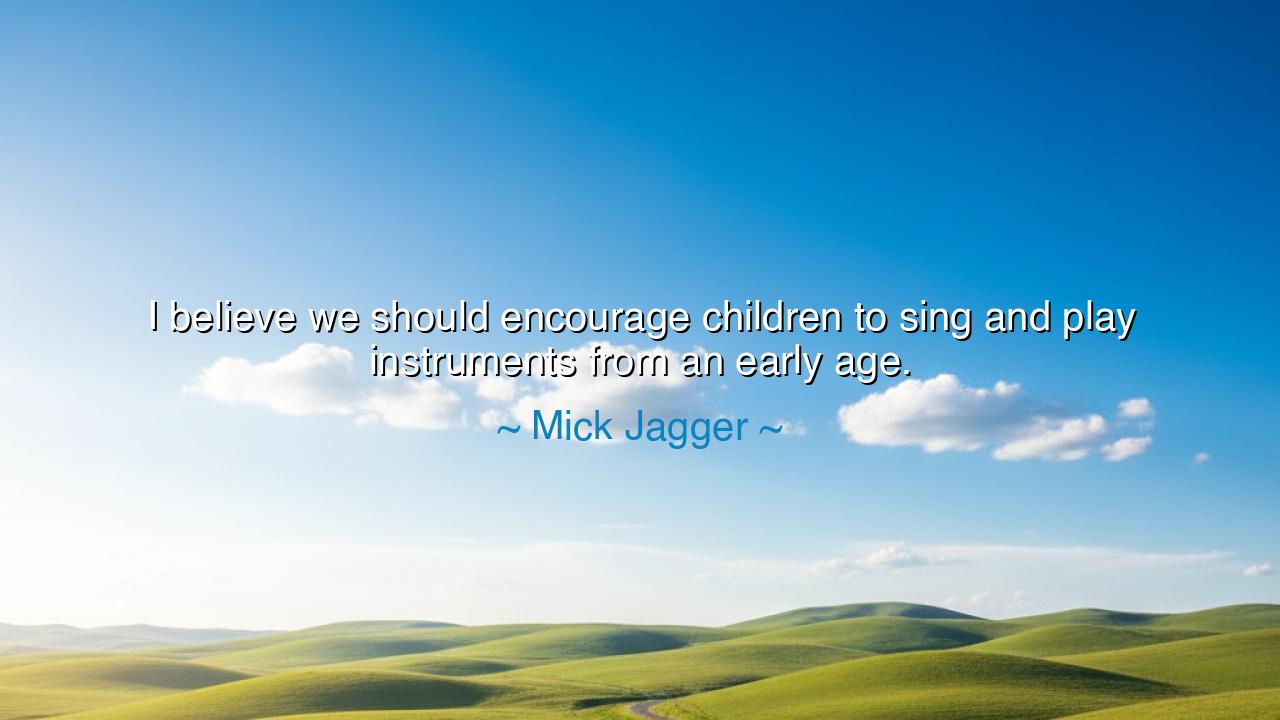
I believe we should encourage children to sing and play






In the fertile soil of childhood, where the seeds of creativity are planted, there lies a treasure that can shape the very essence of a person’s future: the gift of music. The great musician Mick Jagger, whose voice has resonated across generations, once imparted this wisdom: "I believe we should encourage children to sing and play instruments from an early age." These words are not just the musings of a performer but a profound truth that speaks to the very heart of human expression and growth. To sing, to play, is to unlock the ancient power that flows through our souls—a force that connects us to one another, to the world, and to something greater than ourselves.
What does it mean, then, to encourage children to sing and play instruments? It is to recognize the divine spark within every young soul, a spark that calls for nourishment through the arts. From the moment a child first hears a melody, there is an invitation to explore the world of sound and rhythm, to express emotions that words alone cannot convey. Music, in all its forms, provides a language that transcends barriers, a universal tongue that unites us, regardless of age, race, or culture. To encourage a child to sing or play an instrument is to give them the key to this boundless realm of possibility, to allow their inner harmony to find expression in the world.
Consider the example of the great Ludwig van Beethoven, whose music continues to echo through the halls of history. It is said that Beethoven’s early exposure to music, under the stern guidance of his father, shaped him into a prodigy. Yet, even as a young child, he did not simply learn to play instruments—he became one with the music, and the music became his voice. His compositions, filled with power and passion, spoke of his inner struggles, his triumphs, and his hopes. Had Beethoven’s early education in music been neglected, who can say whether the world would have known the great symphonies and sonatas that continue to move us today? Music gave him the language to articulate his soul, and in doing so, it changed the course of history.
Let us also turn to the story of Wolfgang Amadeus Mozart, whose musical gifts began to unfold before the world at the tender age of five. A prodigy born into a family of musicians, Mozart’s exposure to music from an early age allowed him to express the depths of his intellect and emotions with unparalleled skill. His compositions, written before he was even a teenager, are masterpieces that have stood the test of time. Mozart’s life is a testament to the power of early musical education and how it can unlock a person’s true potential. It is not merely the ability to play an instrument that is cultivated, but the development of the mind, heart, and spirit in a way that shapes a legacy for generations to come.
But what of the children today, those who have yet to discover the power of song and instrument? It is upon us to provide them with the gift of this musical education, for in it lies not only the joy of expression but the profound development of the mind and character. Studies have shown time and time again that musical training enhances memory, concentration, and creativity, building bridges between the cognitive and emotional aspects of the child’s development. Jagger’s call is not just a plea for the preservation of the arts but a reminder that music is not merely a talent—it is a tool for the formation of the very self. A child who sings or plays an instrument does not only learn to play notes; they learn to shape their worldview, to harness the power of their emotions, and to speak in ways that words alone cannot.
Indeed, when we think of music, we must think of the transformative power it holds. Music is the universal key that unlocks the doors of creativity, expression, and empathy. To sing, to play an instrument, is to dive into a deep and ancient well, one that has nourished humanity since the dawn of time. From the earliest songs sung around the fire to the orchestras of modern-day concert halls, music has been the heartbeat of civilization. It is no mere pastime—it is the lifeblood of human connection, the means by which we touch the soul and share our deepest truths.
So, let us heed the wisdom of Mick Jagger and pass on this treasure to our children. Let us encourage them to sing, to play, to create, and in doing so, to develop the very essence of their being. Let us not wait for the world to tell them who they should be, but allow them to discover it through the boundless gift of music. In doing so, we do not merely shape skilled musicians—we shape compassionate, creative, and confident individuals who will carry the legacy of human expression into the future. Music is the tool, the instrument of our deepest growth, and in its melodies, we find the keys to both individual and collective transformation.






AAdministratorAdministrator
Welcome, honored guests. Please leave a comment, we will respond soon